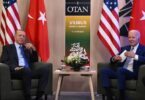Tariq Ullah Wardag
ISLAMABAD: During the Elections Act 2017 amendment proceedings on Tuesday, the Supreme Court (SC) asked as to how a person, who has been declared dishonest, can become a party head and lead honest people.
The court asked Farogh Naseem to explain how the act was in contradiction with the Constitution.
Barrister Farogh Naseem, representing opposition MNA Sheikh Rashid, replied that according to Article 63-A of the Constitution, important powers were vested in the office of party chief, including disqualification of a legislator belonging to their party. The party chief can also influence legislation and election of prime minister, Naseem argued.
Barrister Farogh Naseem, further added that the law was brought into effect only 17 days after Sharif’s disqualification by the SC in Panamagate case.
To which the CJP remarked that the law was passed only to decrease the effect of disqualification.
The counsel argued that the law is in contradiction with the Constitution, as the party chief can influence legislation, even the election of prime minister.
He said that it was a person’s fundamental right to be led by a trustworthy, honest leader.
“According to you, party chief has a lot of powers,” Justice Nisar remarked. Justice Ijazul Ahsan said that according to the counsel, the party chief would be a kingmaker of sorts and an untrustworthy and untruthful person will control Sadiq (truthful) and Ameen (trustworthy) legislators.
Naseem argued that it is the people’s fundamental right to be represented by honest people.
He said that Nawaz Sharif was unable to provide a money trail in Panama Papers case but was cut short by the CJP who said that the matter has been decided and should not be discussed further.
Meanwhile, Nawaz Sharif’s counsel Azam Nazeer Tarar has prepared a written answer regarding his client’s disqualification under Article 62(1)(f).
Azam Nazeer Tarar has opted the stance that disqualification period has not been determined, therefore, it is not for lifetime.
He maintained that barring anyone from participating in elections would be against the basic rights.
The lawyer stated that ineligibility under Article 62(1)(f) is for one time only as disqualification for life is not mentioned anywhere in the constitution.
Azam Nazeer Tarar maintained that ineligibility in contempt of court charges is of five years, and disqualification term in other cases has also been determined but not in Article 62(1)(f).
The counsel further added that he will submit his reply in the apex court after consulting with Nawaz Sharif.






